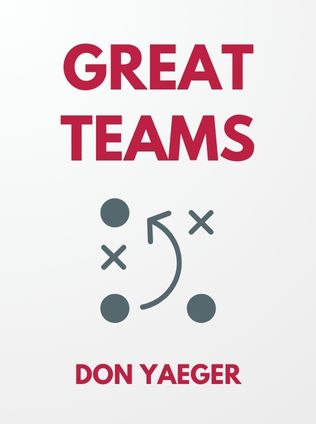
Great Teams
16 Things High Performing Organizations Do Differently
By Don Yaeger
Published 07/2016
About the Author
Don Yaeger, the author of "Great Teams: 16 Things High Performing Organizations Do Differently," is a well-respected journalist and motivational speaker with an impressive track record. As an associate editor for Sports Illustrated, he has honed his ability to identify and articulate the key elements that contribute to high performance. Over his career, Yaeger has penned over two dozen books, nine of which have become New York Times bestsellers. His insights into teamwork and leadership have earned him appearances on major talk shows such as Oprah, Nightline, Fox News, and Good Morning America.
With "Great Teams," Yaeger brings together his extensive research and interviews with over 100 successful teams and organizations to uncover the habits that drive high performance. His work is not just a theoretical exploration but a practical guide for anyone seeking to build or be part of a great team.
Main Idea
In "Great Teams," Don Yaeger identifies 16 characteristics that set apart high-performing teams from the rest. These characteristics are organized into four essential pillars: Targeting Purpose, Effective Management, Activating Efficiency, and Mutual Direction. Each pillar represents a critical aspect of team dynamics that, when mastered, can transform a functional team into a great one. Yaeger emphasizes the importance of culture, leadership, adaptability, and continuous improvement as the cornerstones of sustained success.
Table of Contents
- Introduction
- Targeting Purpose
- Great Teams Understand Their "Why"
- Effective Management
- Great Teams Have and Develop Great Leaders
- Great Teams Allow Culture to Shape Recruiting
- Great Teams Create and Maintain Depth
- Great Teams Have a Road Map
- Great Teams Promote Camaraderie and a Sense of Collective Direction
- Activating Efficiency
- Great Teams Manage Dysfunction, Friction, and Strong Personalities
- Great Teams Build a Mentoring Culture
- Great Teams Adjust Quickly to Leadership Transitions
- Great Teams Adapt and Embrace Change
- Great Teams Run Successful Huddles
- Mutual Direction
- Great Teams Improve Through Scouting
- Great Teams See Value Others Miss
- Great Teams Win in Critical Situations
- Great Teams Speak a Different Language
- Great Teams Avoid the Pitfalls of Success
- Conclusion
Introduction
There is something special about watching a Great Team at work. Whether it's on the gridiron, on the diamond, on the hardwood, or in a corporate setting, when a group of people "click," the environment feels electric and the outcome is often extraordinary. Great Teams are driven to create a culture of greatness. Trendy offenses, tricky defenses, or "hot products" often get the credit for success, but the truly amazing organizations don't stay at the top of their marketplaces without building a team-first culture.
Pillar One: Targeting Purpose
Great Teams Understand Their "Why"
Every day, whether at practice or in a game, an important meeting, or an ordinary day at the office, the highest-performing teams show up with a sense of purpose; they understand the "why" of what they do and can clearly see how it matters. The better an organization understands whom it serves, the more effective it will be in weathering challenges along the way.
"When an organization lays out its cause, how it does so matters. It's not an argument to be made, but a context to be provided. An organization's 'why' literally has to come first — before anything else." - Simon Sinek
Understanding the deeper motivation behind the effort is one of the most important elements of a truly Great Team. Companies that grasp this concept create a powerful sense of duty and purpose for their teams because employees know exactly whom they are working for and to what end.
Pillar Two: Effective Management
Great Teams Have and Develop Great Leaders
Leadership is the key to any organization's success. From the CEO to frontline staff, strong leaders are critical to performance. Great Teams that sustain success place a high value on developing leadership, which leads to consistent behaviors and better habits.
"Context matters. If you were told that you were the Olympian of your chosen profession, then you'd have a context [on which] to base your strengths." - Brad Black
Sign up for FREE and get access to 1,400+ books summaries.
You May Also Like
The Life-Changing Magic of Tidying Up
The Japanese Art of Decluttering and Organizing
By Marie KondoThe Lean Startup
How Today's Entrepreneurs Use Continuous Innovation to Create Radically Successful Businesses
By Eric RiesWho Moved My Cheese?
An Amazing Way to Deal with Change in Your Work and in Your Life
By Spencer Johnson, M.D.Make Your Bed
Little Things That Can Change Your Life...And Maybe the World
By William H. McRaven



















